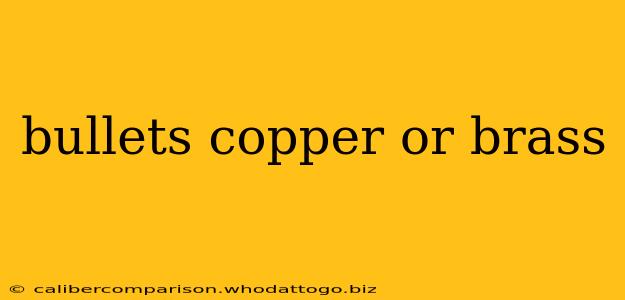Choosing the right ammunition can significantly impact your shooting experience, whether you're a seasoned marksman or a novice. When it comes to bullets, the choice of material plays a crucial role in performance, cost, and application. This article dives deep into the comparison of copper and brass bullets, helping you make an informed decision based on your specific needs.
Understanding the Materials: Copper and Brass
Before we delve into the performance differences, let's clarify the composition of these two common bullet materials:
-
Copper: A reddish-brown metal known for its excellent electrical and thermal conductivity, ductility, and malleability. In bullet construction, its softness allows for easier deformation upon impact, enhancing expansion and energy transfer.
-
Brass: An alloy primarily composed of copper and zinc. The addition of zinc increases the hardness and strength of the material compared to pure copper, resulting in a more durable bullet that retains its shape better during flight.
Copper Bullets: Advantages and Disadvantages
Copper bullets have gained significant popularity among shooters, particularly those focused on hunting and target shooting.
Advantages of Copper Bullets:
- Superior Expansion: Copper's softness allows for greater expansion upon impact, leading to increased wound cavities in hunting applications and better target penetration. This translates to more effective stopping power.
- Environmentally Friendly: Copper is a readily recyclable material, making it a more environmentally conscious choice compared to lead bullets, which are toxic.
- High-Velocity Performance: Copper bullets often perform exceptionally well at higher velocities, maintaining stability and accuracy.
- Excellent Accuracy: When manufactured correctly, copper bullets are known for their superior accuracy.
Disadvantages of Copper Bullets:
- Higher Cost: Copper bullets generally cost more than lead or jacketed bullets due to the higher cost of the raw material.
- Softer Material: While beneficial for expansion, the softness of copper can make it more susceptible to deformation during handling or storage, potentially affecting accuracy.
Brass Bullets: Advantages and Disadvantages
Brass bullets offer a balance between the properties of copper and the durability of harder metals.
Advantages of Brass Bullets:
- Durability: The added zinc in brass increases its hardness and strength, making it less prone to deformation compared to pure copper. This ensures consistent performance and better handling.
- Good Expansion: While not as soft as pure copper, brass still offers good expansion upon impact, particularly in designs optimized for this characteristic.
- Cost-Effective: Brass bullets tend to be more cost-effective than pure copper bullets while offering superior durability to lead bullets.
Disadvantages of Brass Bullets:
- Lower Expansion than Copper: Compared to copper, brass bullets generally exhibit slightly less expansion.
- Potentially Heavier: Depending on the design, brass bullets might be slightly heavier than comparable copper bullets, potentially affecting trajectory.
Choosing the Right Bullet: Copper or Brass?
The optimal choice between copper and brass bullets depends heavily on your specific shooting needs and priorities:
-
Hunters: Copper bullets are often preferred for their superior expansion and stopping power. However, the higher cost needs to be considered.
-
Target Shooters: Both copper and brass bullets can deliver high accuracy. Brass bullets might be a more cost-effective option without compromising accuracy significantly.
-
Environmental Concerns: Copper bullets are a more ecologically friendly choice.
-
Budget: Brass bullets represent a middle ground between cost and performance.
Conclusion: Making the Informed Decision
The decision between copper and brass bullets comes down to a careful consideration of your budget, intended application, and performance expectations. While copper excels in expansion and environmental friendliness, brass provides a balance between performance, durability, and cost. Understanding the advantages and disadvantages of each material allows you to make the most informed choice for your shooting needs. Thorough research of specific bullet manufacturers and their designs will further refine your selection process.

